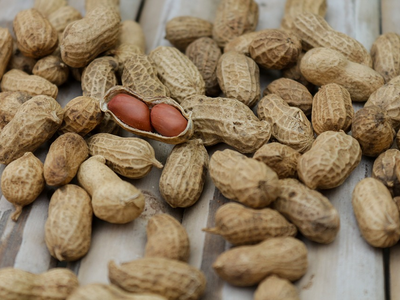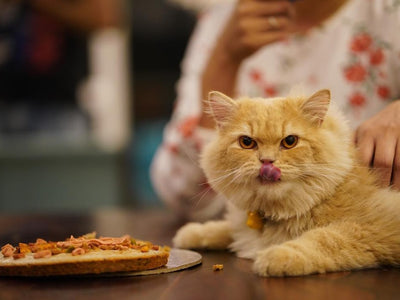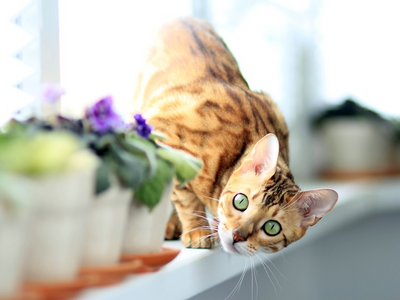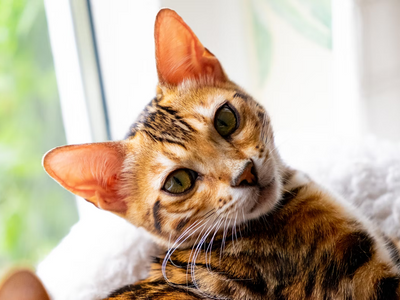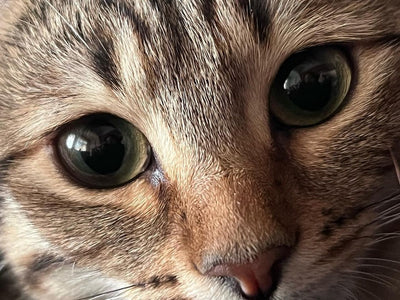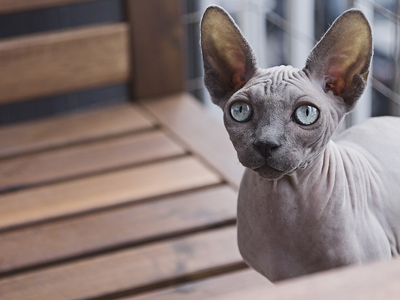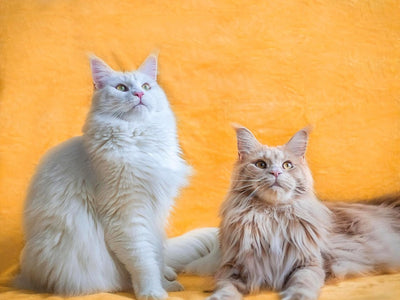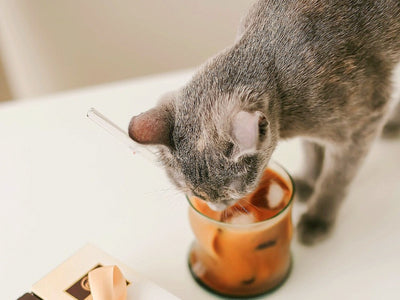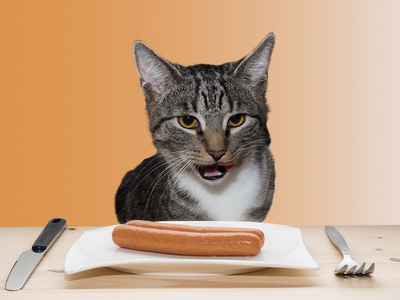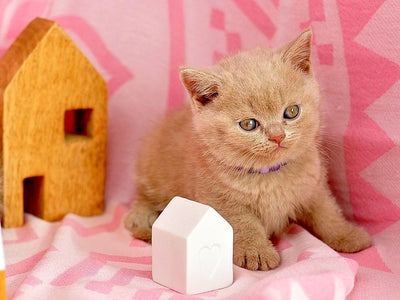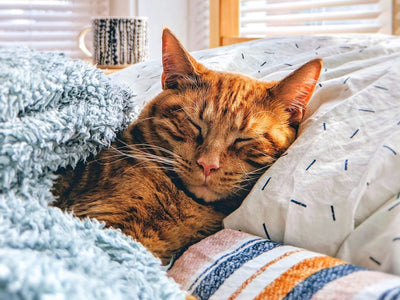28.09.2022
Why does my kitten lick me so much? Let’s get to the bottom of it
"Why does my kitten lick me?" is a question many new cat parents have asked. Don't worry—they are not about to eat you or are dissatisfied with your personal hygiene.
In most cases, cat licking and grooming you is a sign of affection, but there are many other possible reasons for such behaviour. Learn about your kitten’s needs, wants, and the ways to keep them fit and calm in this compact guide.
My kitten keeps licking me—is that normal?
Cats spend half of their day sleeping, and their waking hours are often dedicated to self-grooming(around 8% of their time). Licking is one of the ways to maintain their hygiene and good looks. It is also common for kittens to lick their humans, and there are several theories why they do it, including:
- Showing affection and establishing a bond
- Asking for attention
- Marking their territory
- Enjoying your scent
- Using you as a pacifier
- Dealing with anxiety
- Having medical issues
Your kitten is saying, "I love you"
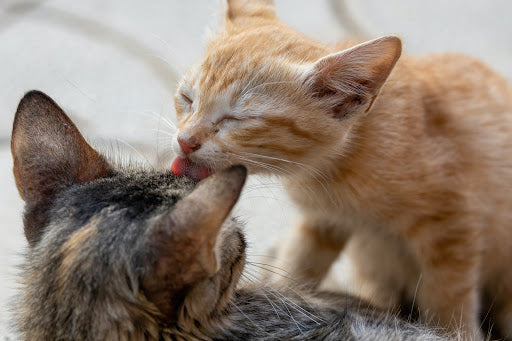
Lickin’ is just kissin’.
Source: Syed Ali
Queens groom their kittens, and even adult cats groom their peers. This is called allogrooming (yes, there is a term). It's a way to establish and strengthen social bonds in the feline world.
Your kitten most likely licks your face because they love you and want to nurture your relationship. It is also their way of showing you that you are a part of their clowder, and they feel safe around you.
Your kitten might want your attention
Cats are smart creatures, so they learn quickly that licking gets your attention. Your kitten may want a cuddle, or they wish to play with you. They could also be trying to tell you they want food or that their litter box needs cleaning.
Your cat is marking you as their territory

Come here! I’m gonna make you mine!
Source: guvo59
Felines are territorial creatures and communicate by marking their territory, objects, and other animals with their scent.
Mothers lick their kittens to transfer their smell to them and create a familiar scent. Your kitten may do the same to you. They want you to smell like their family, a part of their group. A familiar smell means you can be trusted.
Your kitty likes your smell (and taste)
Your furry friend may lick your face or hair because they like your shampoo or lotion, so they want to investigate the tantalising scent. Human sweat also contains salts and other components your kitten may find appealing.
Kitten licking you may be a way of self-soothing
While they are still nursing, kittens knead on their mothers and suckle. Separating them from the queen too early can result in long-term stress. What constitutes too early is subject to debate.
Some experts believe that kittens should stay with their mothers until they are about two months old. Others recommend this period to be longer—between three and four months. A 2017 study that included over 5,700 cats revealed that the later a kitten was weaned, the lower the chances of oral fixation and excessive self-grooming. Kittens in the wild also stay with their mothers for about four months, so it is probably best not to separate them before that.
If your new kitten has been weaned off too early, they may develop an oral fixation and start licking you for comfort as it reminds them of nursing. They will probably purr and knead as they lick you.
Licking can be a sign of anxiety

Cats usually lick themselves to keep themselves clean and calm.
Source: rihaij
Your kitten may start licking you as a distraction from something stressful. Although excessive self-grooming is a typical response to anxiety, licking humans and other animals is also common. In the case of anxiety, excessive licking will usually be accompanied by:
- Refusing to eat
- Hiding
- Avoiding the litter box
- Lethargy
It's crucial to determine what triggers anxiety in your cat and eliminate it or desensitise your feline friend. If you ignore this problem, licking can become a compulsion. Compulsive behaviour can take over your kitty's life, making professional help mandatory.
The most common stressors in felines include:
- Visitors
- Abrupt and frequent disruptions in routine
- New pets
- New family members
- Remodelling
- Noise
- Change of home
A great way to help your feline friend overcome anxiety is to give them plenty of attention. Play with them every day, train them, and spend quality time together. Ensure they have fun toys, food puzzles, and a scratching post or pad so they can have fun on their own.
Licking can be a sign of a medical issue

If your kitten has a tummy ache, they may lick you more than usual.
Source: Roxanne Desgagnés
In less common cases, licking can signify an underlying health problem. Pain, discomfort, and nausea may cause your kitten to lick more. If you notice this behaviour suddenly, take your furry friend to the vet immediately.
Stomach issues, such as inflammatory bowel disease, may cause excessive licking. If this is the root of the problem, your vet will prescribe suitable therapy, and you will probably have to rethink your kitten’s diet.
The good news is that many health problems, especially digestive ones, can be prevented or managed with adequate nutrition, and the diet is the most important aspect of caring for a kitten.
What's a suitable diet for cats?
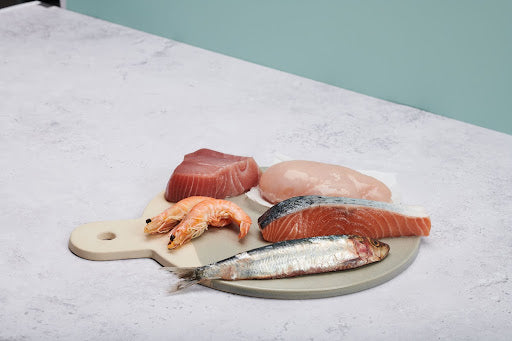
Once kittens start eating solids, they need meat, the whole meat, and nothing but the meat.
Image (c) Untamed
Your kittie’s diet affects their health significantly. Besides knowing how much and how often you need to feed them, you must understand what your kitten should eat.
As obligate carnivores, cats need a meat-based diet. Once a kitten starts eating solids, their food must be:
- Rich in animal protein
- Moderate in animal fat
- Free from grains, vegetable protein, and carbs
- Additive-free
Animal protein
Kittens need animal protein to grow and develop correctly. Meat and fish are the primary sources of energy and all vitamins, minerals, and essential amino acids (like taurine) required for:
- Normal organ function
- Muscle growth
- Strong teeth and bones
- Healthy coat and skin
- Good vision
Lean meat and fish also have higher biological value than vegetable protein sources, as shown in the table below:
|
Protein source |
Biological value |
|
Meat and fish |
88%–98% |
|
Vegetables, legumes, and grains |
45%–68% |
Cat food—wet or dry— should contain more than 50% of animal protein and have the following as the main ingredient:
Animal fat
Animal fat is necessary because it:
- Delivers healthy fatty acids
- Ensures nutrient utilisation and transportation
- Supports healing
- Strengthens the immune system
- Ensures cell integrity
Animal fat also gives food an irresistible taste, which is essential because the healthiest food would be useless if your kitten refuses to eat it.
Ham, bacon, pork, lamb, and beef are natural taste enhancers, but they should be fed in moderation because of their high fat content. Beef is also a common allergen, so if you treat your kitten with tiny bits of beef, monitor how they react.
Avoid carbs

Fruit and veggies are great for humans, but they are a sure way to stomach problems for kitties.
Source: Sharon Pittaway
Carbohydrates are difficult to digest and don't provide proper nutritional value to felines. Grains, fruits, and vegetables can cause indigestion and make your kitty fat, so keep them under 3% of your kitty’s daily food intake.
Human food can also be harmful to cats, so check out the ingredients to avoid in the table below:
|
Difficult to digest ingredients |
Common allergens |
|
These ingredients can cause your kitten gastrointestinal problems, including:
- Irritable bowel syndrome
- Vomiting
- Diarrhoea
- Flatulence
- Indigestion
Additives
Harsh additives like preservatives, artificial taste enhancers, and chemical colourants can harm felines.
Many commercial products contain sugar to make the food glossier and more appealing to the buyer. Added sugar can lead to obesity, resulting in diabetes and heart disease.
Cat food often contains meat derivatives to make the product cheaper. These ingredients fail to provide cats with the necessary nutrients and lead to digestive problems.
If the ingredient list on cat food mentions additional vitamins, it usually means that the meat content is low. Cat food with enough whole meat or fish doesn’t require supplements.
Keep your kitten healthy with Untamed

Untamed knows what your kitten needs.
Image (c) Untamed
If you are looking for high-quality, tasty cat food for your growing kitten, Untamed is the right choice.
We know what healthy feline nutrition should be, so our meals are:
- Full of animal protein—Our dishes contain twice as much animal protein as most products on the market. We only use the best-quality whole meat and fish
- Formulated in collaboration with vets—Our jellies and gravies are suitable for all felines (kittens, adults, seniors). We collaborate with vets to create recipes that won’t cause digestive problems or food allergies
- Fussy cat-approved—Our delicacies are gently steamed, so all the nutrients are locked together, harmful pathogens are destroyed, and deliciousness is preserved. Even finicky eaters adore Untamed
- Ethically made—Our operations are carbon footprint neutral from start to finish. We source our ingredients from responsible, cruelty-free suppliers, and our packaging is 100% recyclable
What can Untamed do?
Many satisfied cat parents shared the remarkable improvements they witnessed once their kitties switched to Untamed.
Here is what they say:
|
Timeline |
The Untamed effect |
|
First week |
|
|
Eighth week |
|
|
Sixteenth week |
|
|
Long-term |
|
Getting Untamed for your kitten
Untamed makes ordering healthy cat food online simple. Here's what you should do:
- Go to our Try Now page and share some details about your kitten
- Pick the products and create a customised meal plan
- Place your order
Your starter pack will arrive in a day, and your kitten can start exploring our delicacies immediately. Once they choose their favourite dishes, we can send fresh and healthy meals every month with no shipping fees.
Why does it hurt when you let your kitten lick you?

Kitties have coarse tongues that resemble sandpaper. Very harsh sandpaper.
Source: bongbabyhousevn
Your kitten licking you, while adorable, is not at all pleasant. That's because their tongues are covered in papillae—tiny, firm backwards-facing spikes made of keratin.
Licking is not painful as biting or scratching, but it’s not the best sensation. Papillae work as a comb and help kitties remove loose hair and dirt from their coats and cover it with saliva to keep them cool.
Is it safe to let your kitten lick you?
Although letting your kitten lick may hurt a bit, it won't harm you except in the following cases:
- Licking may exacerbate a wound, scratch, or another skin issue (felines carry bacteria in their mouths, which might also cause an infection)
- If you have sensitive skin, licking may irritate it
- Cat-allergy sufferers may have a severe reaction to licking
Sometimes, allowing your kitten to lick you can harm them because of the substances you may have applied to your skin.
How to stop a kitten from licking you
Licking may be uncomfortable and annoying, but punishment is never an appropriate way to stop it, so avoid:
- Scolding
- Hitting
- Squirting water
- Making loud noises
- Using bitter spray
Such methods will only compromise your relationship with your feline companion and make them anxious.
The appropriate ways to discourage your kitten from licking include:
- Distracting your kitten with toys or catnip
- Walking away when they start licking you
- Redirecting your kitty's mouth gently away from you
- Wearing long sleeves and covering your hands when interacting with your kitten
- Rewarding your kitten whenever they interact with you without licking
- Providing plenty of toys and devoting at least an hour to playtime every day

![Associated image for What human food can Sphynx cats eat? [Comprehensive list]](http://untamed.com/cdn/shop/articles/what_human_food_can_sphynx_cats_eat_Featured_400x300_crop_center.jpg?v=1648705074)
